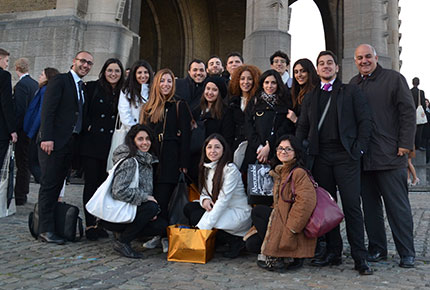Harvard World MUN: a journey of self-discovery
Upon their return from Harvard World Model United Nations, political science students shared their story.

Outside the conference room, social events added a new dimension to the Harvard WorldMUN experience.
It was with flight AZ0827, bounding toward the capital of Europe, Brussels, that a delegation of 20 LAU students embarked on a journey of self-discovery. For the following week, the students were ardently engaged in negotiation, debate and diplomacy at the world’s most vibrant simulation of the United Nations: the Harvard World Model United Nations.
From all four corners of the globe, the event this year reflected a colorful diversity with the presence of over 2,000 students from more than 60 countries. This diversity was also reflected in the LAU delegation that consisted of students from five countries: Egypt, Iraq, Jordan, Lebanon and Morocco.
For a hectic two months prior to the trip, Associate Professor of Political Science/International Affairs Marwan Rowayheb, also associate chair at the Department of Social Sciences, was directly engaged with the students in Byblos preparing, following up and ensuring the most qualified were selected. In Beirut, the process was no less fervent. Assistant Professor of Political Science/International Affairs Jennifer Skulte-Ouaiss dedicated much of her valuable time working with the students, unleashing their skills and potentials to guarantee the best representation.
Student Head Delegate Fadel Saleh, a senior of Political Science/International Affairs, expressed his appreciation and pride in taking part in such an unparalleled experience, “The Harvard World MUN experience was life changing; a world class conference and an extended family of 19 LAU delegates”.
Fadel’s colleague Yasmin Atia tackled the pressing issue of ethnic conflict in the Special Political and Decolonization Committee. Besides exploring the different aspects of ethnic conflict, such as its causes and ways of prevention, working on a resolution that combines different solutions was the best part about Yasmin’s experience, “As well as learning more about what diplomats do and what I want to be”.
At the house of the Belgian Ministry of Foreign Affairs, the Egmont Palace, eight LAU delegates were involved in a fierce debate concerning drone attacks—without formal declaration of war—at the largest committee of this year’s Harvard WorldMUN: Disarmament and International Security (DISEC).
For Barik Mahadin, Political Science/International Affairs junior with a minor in Economics, the DISEC experience was truly unique, “With 400 delegates, the debate was so exhilarating. It really taught me about negotiations and dialogue … the best part? I got to practice hallway diplomacy”. Touching on the prestigious venue, Barik added that it was a “surreal moment, or a moment of fame perhaps, when they asked us to conclude our session earlier on one day, as the United Nations needed the room for a special meeting”
On a similar note, SaraBelle Khalifeh and Naya Dagher, both Political Science/International Affairs students, were further introduced to their capabilities and potentials. “Better than I could ever imagine; literally mind opening,” said Naya when asked about her experience, while spontaneously responded SaraBelle, “I am fascinated by the number of international students that I met, and I am now more hopeful of a better and a brighter future”.
Each night, outside the conference room, social events added a new dimension to the Harvard WorldMUN experience. A common sense of identity was created between the 2,000 students as they celebrated their traditional music, cultural costumes and folk dances in a loud and lively atmosphere.
Crystel Abdullah, Political Science/International Affairs student, thinks that Harvard WorldMUN is a ‘one-of-a-kind experience’ where she found out that “Yes, it is possible to build lasting friendships in a short period of time”. With a genuine smile she added: “It was an honor to participate in such an enormous conference. Thank you LAU delegation for making this experience an amazing one! Without you it would not have been the same”..
For each and every delegate, the highlight of their experience was the wise, gentle and caring company of Dr. Makram Ouaiss, assistant professor of Political Science, and Khaled Kabbara, LAU Byblos graduate student of International Affairs. While Ouaiss was the father figure, whose guidance and leadership pushed the students to their utmost professionalism and competence, Khaled was the big brother, whose WorldMUN and travel experiences made the trip one to remember.
As the world is becoming rapidly more globalized, the nature of diplomatic professions and practices has changed. LAU’s untiring efforts to prepare global leaders, influential policymakers and prominent diplomats made this journey a reality. As Layane El Horr, a senior Economics student, put it: “The truth is, besides what we get to learn about the UN, our respective committee, topic or country, we learn much more about who we are. The difficult situations I was put under when some delegates retracted on signing my draft resolution, or when I had to make a choice between two resolutions, flawed and winning or flawless and failing, all taught me equally on how to assign my priorities, choose my battles, handle any pressures and be always soft on the person but hard on the issue. I learned that diplomacy is about both victory and defeat.”
By Barik Mahadin, Political Science/International Affairs
More
Latest Stories
- SOE Launches its Distinguished Scholar Visiting Program with International Guest Dr. Feras Batarseh
- LAU Nursing Camp Opens Eyes, Hearts and Futures
- Meet Dr. Zeina Khouri-Stevens, Executive Vice President for Health Services
- LAU Family Medicine Graduates to Benefit from a Partnership With Nova Scotia
- AKSOB Assistant Professor Shares Her Vision for the Future of Learning
- LAU Simulation Models Celebrate 20 Years of Learning, Leadership and Service
- The School of Engineering Hosts the Lebanese Electromagnetics Day
- LAU Stands Out on the Sustainability Scores

